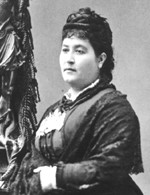-
|

|
Chapter 5: Late Nineteenth Century
and Realism
María Amparo Ruiz de Burton
1832-1895
|
©
Paul P. Reuben
September 10, 2019
E-Mail
|
Page Links: |
Primary
Works |
Selected
Bibliography 1980-Present
| MLA
Style Citation of this Web Page
|

María Amparo
Ruiz de Burton was the first Mexican American author in the United
States to write novels in English. María wrote two novels Who
Would Have Thought It? (J.B. Lippencott and Co.: Philadelphia, 1872)
and The Squatter and the Don (S. Carson and Co.: San Francisco, 1885)
under pen name C. Loyal. She became a resident of San Diego.
María was born in La
Paz, Baja California and came to California in 1849 married a
military officer, Henry Stanton Burton. María's great uncle,
Francisco Ruiz had been the comandante of San Diego in the early
1800s. In California she studied English under a tutor and was a
life-long friend and correspondent with Maríano Vallejo, a
respected Californio in Sonoma. In 1852 María and her husband
lived at an army post at Mission San Diego and together they
purchased Rancho Jamul. She wrote to Vallejo of her aspirations:
"...I am persuaded that we were born to do something more than simply
live, that is, we were born for something more, for the rest of our
poor countrymen." Living on rancho Jamul, the Burtons made
improvements on it and submitted its title to the Court of Land
Claims. For the next few decades María would be involved in
dozens of lawsuits while trying to retain title to her land. After
her husband's death she moved to New Town where she wrote her novel,
The Squatter and the Don. It was published in 1885. All the while she
was involved in litigation over Jamul and eventually her attorney
fees for the litigation and the costs of unpaid mortgages forced her
into bankruptcy. She traveled to Chicago to find help for her fight
for her rights to another rancho that had been in her family, Rancho
Ensenada de Todos Santos. There she died in 1895 trying to get
political support for her claims. - Source: San
Diego Chicano History
Primary
Works
Who would have thought it?
edited and introduced by Rosaura Sanchez and Beatrice Pita. Houston:
Arte Publico Press, 1995. PS2736 .R53 W48
The squatter and the don. edited
and introduced by Rosaura Sanchez and Beatrice Pita. Houston: Arte
Publico Press, 1997. PS2736 .R53 S658
Conflicts of interest: the letters of
María Amparo Ruiz de Burton. edited, with a commentary, by Rosaura
Sanchez and Beatrice Pita. Houston: Arte Publico Press, 2001. PS2736
.R53 Z48
Selected
Bibliography 1980-Present
Alemán, Jesse.
"Citizenship Rights and Colonial Whites: The Cultural Work of
María Amparo Ruiz de Burton's Novels." in Goldstein, David S.
and Thacker, Audrey B. eds. Complicating Constructions: Race,
Ethnicity, and Hybridity in American Texts. Seattle: U of
Washington P, 2007.
Aranda, José F., Jr.
"Contradictory Impulses: María Amparo Ruiz de Burton,
Resistance Theory, and the Politics of Chicano/a Studies." in
Davidson, Cathy N. and Jessamyn Hatcher. eds. No More Separate
Spheres! A Next Wave American Studies Reader. Durham: Duke UP,
2002.
González, John M.
The Troubled Union: Expansionist Imperatives in
Post-Reconstruction American Novels. Columbus: Ohio State UP,
2010.
González, Marcial.
Chicano Novels and the Politics of Form: Race, Class, and
Reification. Ann Arbor: U of Michigan P, 2009.
Lomelí, Francisco A.
and Carl R. Shirley. eds. Chicano Writers: Third Series.
Detroit: Gale, 1999.
Montes, Amelia, and Anne
Goldman. eds. María Amparo Ruiz de Burton: Critical and
Pedagogical Perspectives. Lincoln: U of Nebraska P, 2004.
Montes, Amelia M. "Maria
Amparo Ruiz de Burton Negotiates American Literary Politics and
Culture." in Warren, Joyce W. Women, Money, and the Law:
Nineteenth-Century Fiction, Gender, and the Courts. Iowa City: U
of Iowa P, 2005.
Rivera, John-Michael.
"Embodying Manifest Destiny: María Amparo Ruiz de Burton and
the Color of Mexican Womanhood." in The Emergence of Mexican
America: Recovering Stories of Mexican Peoplehood in U.S.
Culture. NY: New York UP, 2006.
MLA Style
Citation of this Web Page
Reuben, Paul P. "Chapter 5: María
Amparo Ruiz de Burton (1832-1895)." PAL: Perspectives in
American Literature- A Research and Reference Guide. URL:
http://www.paulreuben.website/pal/chap5/burton.html (provide page date
or date of your login).
| Top |

